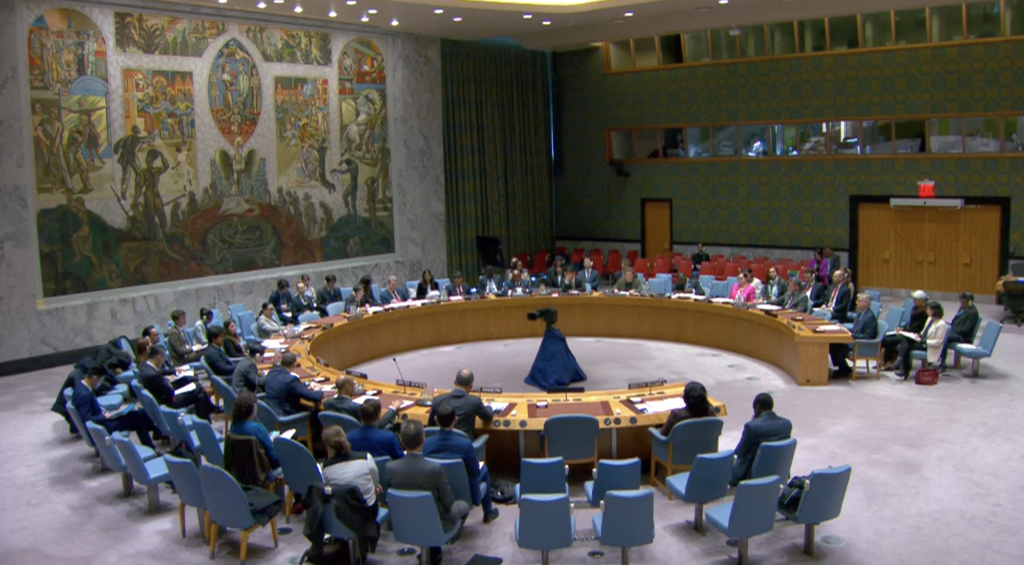Statement by Deputy Permanent Representative Anna Evstigneeva at UNSC briefing on the situation in South Sudan
Mr.President,
We thank USG Lacroix for the briefing. We welcome the Permanent Representative of South Sudan to this meeting.
We have carefully studied the report of the Secretary-General on the situation in South Sudan. We note its special and just emphasis on the humanitarian component. It is exacerbated by the growing number of refugees and returnees from neighboring Sudan, whose number, according to the latest estimates, has exceeded 560,000. That influx is contributing to instability. That is why it is important that UNMISS and other United Nations structures working in the Republic of South Sudan step up their efforts to provide humanitarian assistance. The South Sudanese cannot manage this complex task if they stand alone, for it requires material support and expertise.
Inter-communal violence remains another area of concern for South Sudan. While there has been no overall degradation of the situation, sporadic clashes in various parts of the country are a cause for concern. We must realize that such clashes are rather economic than ethnic, stemming from disputes over lucrative land and control over trade flows, especially near Juba. We see room for a more involved role for UNMISS peacekeepers in curbing inter-communal violence and helping to create a capable unified armed force.
The leadership of the country is ready to engage on this issue, as evidenced by the deployment of limited contingents of the joint military forces in a number of South Sudanese states. Ultimately, ensuring the self-sufficiency of the unified national armed forces is key to the success of the political process. The current sanctions regime against South Sudan is a significant obstacle to achieving this priority goal. It complicates the deployment and proper equipping of the army and the strengthening of state security structures. We strongly oppose the use of UNSC sanctions for exerting pressure or interfering in internal affairs, as well as supplementing sanctions with illegal unilateral restrictive measures.
We should like to note separately that ICAO’s decision to declare the status of a significant safety concern (which relates only to dual-registered aircraft) should not apply to Russian aircraft. We regret the Secretariat's decision to extend this concern to Russian helicopters as well. As a result, UNMISS no longer has access to this indispensable equipment in South Sudan, to which it is extremely problematic to find alternatives. It turns out that the logistics, security and safety of UNMISS suffer from the arbitrary steps of our Western colleagues. We should like to emphasize that UN peacekeeping operations must have all the necessary resources to fulfil their mandate.
Mr.President,
The efforts taken by the South Sudanese authorities (with the assistance of UNMISS) in training, humanitarian response programmes, inter-community dialogue and state-building, including financial and political support for elections, are commendable.
Taking into account the challenges that South Sudan is facing, we can say that the political process in the country is generally moving forward. In addition to the already established local governments, the transitional parliament, the national human rights council, the national electoral commission has commenced its activities. Legislation on political parties has been drafted. In the near future, political parties should elaborate a code of conduct. At the same time, some benchmarks for election preparations indicate that the process is dropping behind schedule. We trust that the South Sudanese authorities will accelerate their implementation to the extent possible. While it is understood that the benchmarks are not externally imposed criteria but points agreed upon by the signatories to the Revitalized Peace Agreement, they still overlook an important point - the quality of the preparation and convening of elections. Of course, timing is important. What’s even more important though is the establishment of sustainable and responsible state institutions that have the trust of the people of South Sudan. This is what should be the main criterion rather than Juba's compliance with a "critical mass" of measures (that are not fully understood at this point) for the implementation of the political process. Colleagues, our common task is not to wait for South Sudanese to fail to hold elections in order to criticize and punish them, but to work together to help them through this difficult process, which should mark the successful completion of the transition period.
Ultimately, if the South Sudanese authorities realize that these timelines will need to be shifted in the interest of improving quality, the Revitalized Peace Agreement provides for such an option. Of course, it would require a consensus decision by all political forces.
The successful holding of elections, the completion of the transition period and the stabilization of the country are first and foremost the responsibility of South Sudanese themselves. We are confident that they can form the political process as they see best and are perfectly capable of determining the fate of their country on their own.
Thank you.
